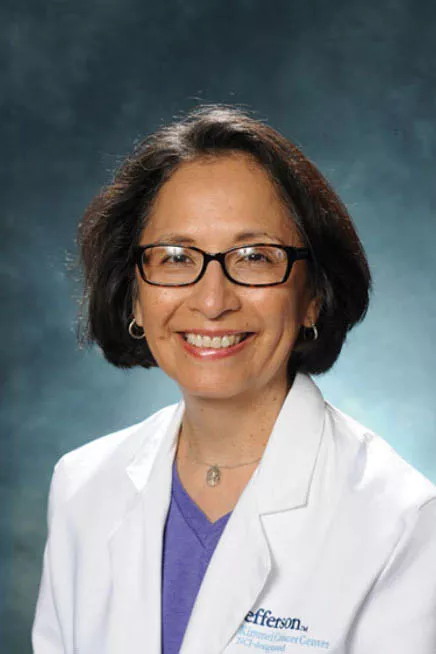Anassa Kata: Ana María López ’81
The physician was honored by Al DÍa
Ana María López ’81, MD, MPH was recently honored with the 2022 Lifetime Achievement Award from Al DÍa News Media. López, a former BMC trustee, is professor and vice chair of medical oncology at Sidney Kimmel Medical College and chief of cancer services at Sidney Kimmel Cancer Center-Jefferson Health in New Jersey. López’s clinical expertise is in women’s malignancies, integrative medicine and oncology, and telehealth. Previously with the University of Utah’s Huntsman Cancer Institute and the University of Arizona, López was an early pioneer in the use of telemedicine to reach women in rural communities in Arizona.
What does this award mean to you?
One of the things that I’m very committed to is women’s health and Latino health, and this award and honor from my community is very meaningful. It’s, you know, it’s from mi gente, my people.
Throughout your career, you’ve looked at healthcare through an equity lens. Where did that come from?
Both my parents are physicians, and I think very early on I had the sense that it’s really hard for people. As a child, you see things very simply, and I just thought if somebody’s sick, they should be able to get healthcare. I saw that was just not true for many, and that was very startling to me.
How did your Bryn Mawr education influence your career?
I was a philosophy major. My critical thinking is something that comes from my college experience, and I think that’s one of the best things that I bring to the table. I had that simple passion as a child, and then I was able to give it legs and arms with my critical thinking.
Tell us about your work in telemedicine in Arizona.
In 1996, the Arizona Telemedicine Program was established, and I was the founding medical director. Our goal was to set up the entire state to increase access to specialty care. Before, people would go to clinics to get care, and really where we were in the transition with telemedicine was that people were now going to be able to access healthcare through their phone or a laptop or desktop. And that’s really where it’s been hard because not everybody has the right technology, not everybody has the right broadband.
When there’s an increase in technological innovation, you also see an increase in disparities. So that’s the space we’re in right now, but I’m hopeful that we can address the disparities piece.
Do you still see patients?
Yes. I think that at my core I’m a clinician, and the patient physician relationship is, well, it’s sacred really. I also feel that in many ways the patient physician relationship informs my thinking. Certainly, in the thinking around inclusion, where you’re wanting to meet people where they are, that’s so similar to how you approach a patient.
Why were you drawn to oncology?
It’s very intellectually challenging. There’s so much that we don’t know. And it’s also this incredible opportunity to be with a person at a time when they are very vulnerable and to really make a difference. There’s always the opportunity for healing. A cure is not always available, but healing is always available.
Why did you come back to the East Coast?
I very intentionally wanted to come back. My children were moving east. And I think as you get older, you have this sense of wanting to give back. I feel like I want to give back to the College and to my medical school. I really wanted to come to Jefferson and make a difference.
There’s an at-home feeling that I have here. It’s not that I grew up here. I mostly grew up in Chicago, and then we moved to Phoenix when I was 16. I think it’s because college is such a formative time. Medical school is such a formative time. I really love being here.
Published on: 05/03/2022
